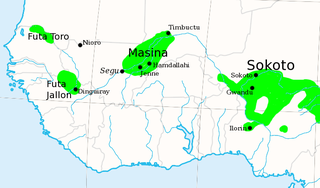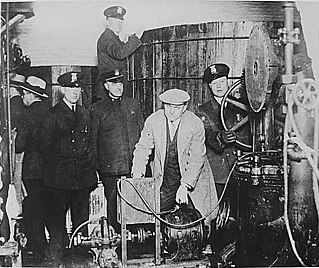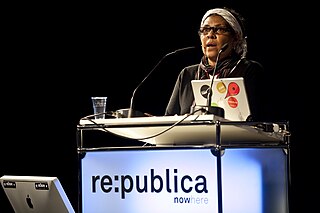Related Research Articles

Alcohol intoxication, also known as drunkenness or alcohol poisoning, is the negative behavior and physical effects due to the recent drinking of ethanol (alcohol). Symptoms at lower doses may include mild sedation and poor coordination. At higher doses, there may be slurred speech, trouble walking, and vomiting. Extreme doses may result in a decreased effort to breathe, coma, or death. Complications may include seizures, aspiration pneumonia, injuries including suicide, and low blood sugar.

Nigeria, officially the Federal Republic of Nigeria, is a country in West Africa, bordering Niger in the north, Chad in the northeast, Cameroon in the east, and Benin in the west. Its coast in the south is located on the Gulf of Guinea in the Atlantic Ocean. The federation comprises 36 states and 1 Federal Capital Territory, where the capital, Abuja, is located. The constitution defines Nigeria as a democratic secular state.

The Niger River is the principal river of West Africa, extending about 4,180 km (2,600 mi). Its drainage basin is 2,117,700 km2 (817,600 sq mi) in area. Its source is in the Guinea Highlands in southeastern Guinea. It runs in a crescent through Mali, Niger, on the border with Benin and then through Nigeria, discharging through a massive delta, known as the Niger Delta or the Oil Rivers, into the Gulf of Guinea in the Atlantic Ocean. The Niger is the third-longest river in Africa, exceeded only by the Nile and the Congo River. Its main tributary is the Benue River.

Prohibition is the act or practice of forbidding something by law; more particularly the term refers to the banning of the manufacture, storage, transportation, sale, possession, and consumption of alcoholic beverages. The word is also used to refer to a period of time during which such bans are enforced.

Septimius Severus, also known as Severus, was Roman emperor from 193 to 211. He was born in Leptis Magna in the Roman province of Africa. As a young man he advanced through the customary succession of offices under the reigns of Marcus Aurelius and Commodus. Severus seized power after the death of Emperor Pertinax in 193 during the Year of the Five Emperors.

The Eighteenth Amendment of the United States Constitution established the prohibition of "intoxicating liquors" in the United States. The amendment was proposed by Congress on December 18, 1917, and was ratified by the requisite number of states on January 16, 1919. The Eighteenth Amendment was repealed by the Twenty-first Amendment on December 5, 1933.

The temperance movement is a social movement against the consumption of alcoholic beverages. Participants in the movement typically criticize alcohol intoxication or promote complete abstinence from alcohol (teetotalism), and its leaders emphasize alcohol's negative effects on people's health, personalities and family lives. Typically the movement promotes alcohol education and it also demands the passage of new laws against the sale of alcohol, either regulations on the availability of alcohol, or the complete prohibition of it. During the 19th and early 20th centuries, the temperance movement became prominent in many countries, particularly in English-speaking and Scandinavian ones, and it eventually led to Prohibition in the United States which lasted from 1920 to 1933.

The Massina Empire was an early nineteenth-century Fulbe Jihad state centered in the Inner Niger Delta area of what is now the Mopti and Ségou Regions of Mali. Its capital was at Hamdullahi.
The repeal of Prohibition in the United States was accomplished with the passage of the Twenty-first Amendment to the United States Constitution on December 5, 1933.

Nigeria, the most populous African country, is nearly equally divided between Christianity and Islam, though the exact ratio is uncertain. The majority of Nigerian Muslims are Sunni and are concentrated in the northern region of the country, while Christians dominate in the south. Most of Nigeria's Christians are Protestant though about a quarter are Catholic.

The current conflict in the Niger Delta first arose in the early 1990s over tensions between foreign oil corporations and a number of the Niger Delta's minority ethnic groups who feel they are being exploited, particularly the Ogoni and the Ijaw. Ethnic and political unrest has continued throughout the 1990s despite the conversion to democracy and the election of the Obasanjo government in 1999. Competition for oil wealth has fueled violence between ethnic groups, causing the militarization of nearly the entire region by ethnic militia groups, Nigerian military and police forces, notably the Nigerian Mobile Police. The violence has contributed to Nigeria's ongoing energy supply crisis by discouraging foreign investment in new power generation plants in the region.

The African Theatre of World War I describes campaigns in North Africa instigated by the German and Ottoman empires, local rebellions against European colonial rule and Allied campaigns against the German colonies of Kamerun, Togoland, German South West Africa and German East Africa. The campaigns were fought by German Schutztruppe, local resistance movements and forces of the British Empire, France, Italy, Belgium and Portugal.

The East African campaign in World War I was a series of battles and guerrilla actions, which started in German East Africa (GEA) and spread to portions of Portuguese Mozambique, Northern Rhodesia, British East Africa, the Uganda Protectorate, and the Belgian Congo. The campaign all but ended in German East Africa in November 1917 when the Germans entered Portuguese Mozambique and continued the campaign living off Portuguese supplies.
Sokari Douglas Camp CBE is a London-based artist who has had exhibitions all over the world and was the recipient of a bursary from the Henry Moore Foundation. She was honoured as a Commander of the Order of the British Empire (CBE) in the 2005 Birthday Honours list.

Conflicts took place in North Africa during World War I (1914–1918), between the Entente and the Central powers. The Senussi of Libya sided with the Ottoman Empire against the British Empire and the Kingdom of Italy. On 14 November 1914, the Ottoman Sultan proclaimed Jihad and sought to create a diversion to draw British troops from the Sinai and Palestine Campaign. The Italian state wished to preserve the gains made in the Italo-Turkish War. The Senussi Campaign took place in north Africa, from 23 November 1915 – February 1917.

Prohibition in the United States was a nationwide constitutional ban on the production, importation, transportation, and sale of alcoholic beverages from 1920 to 1933.

King Frederick William Koko, Mingi VIII of Nembe (1853–1898), known as King Koko and King William Koko, was an African ruler of the Nembe Kingdom in the Niger Delta, now part of southern Nigeria.

Teetotalism is the practice or promotion of complete personal abstinence from alcoholic beverages. A person who practices teetotalism is called a teetotaler or is simply said to be teetotal. The teetotalism movement was first started in Preston, England, in the early 19th century. The Preston Temperance Society was founded in 1833 by Joseph Livesey, who was to become a leader of the temperance movement and the author of The Pledge: "We agree to abstain from all liquors of an intoxicating quality whether ale, porter, wine or ardent spirits, except as medicine."

Sokari Ekine is a Nigerian activist, blogger and author. She worked as a journalist at the Pambazuka News and has also written for Feminist Africa and New Internationalist. Ekine kept a blog between 2004 and 2014 in which she covered a number of topics including LGBTI rights, women's rights, and environmental issues. She has co-written or edited four books, and taught English to school children in Haiti.
References
- 1 2 Sanneh, Lanim (2008). New Encyclopedia of Africa. Thomson Gale. pp. 267–68. ISBN 0-684-31455-X.
- 1 2 Tasie, G.O.M. (1978). Christian missionary enterprise in the Niger delta, 1864-1918. Leiden: Brill. ISBN 9004052437.
- 1 2 Ludwig, Frieder (November 1993). "Elijah II: Radicalisation and Consolidation of the Garrick Braide Movement 1915-1918". Journal of Religion in Africa. 23 (4): 296–317. doi:10.2307/1580988.
- ↑ Brockman, Norbert. "Braide, Garrick Sokari Marian (A)". Dictionary of African Christian Biography. Retrieved 20 February 2018.
- ↑ Ifeanyi, Ibe (4 December 2016). "Christ Army ordains new priests" . Retrieved 20 February 2018.
| This biographical article about a Nigerian religious figure is a stub. You can help Wikipedia by expanding it. |